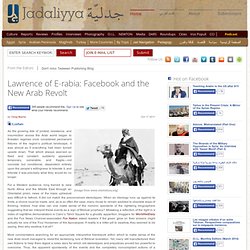

Film: Burhan Wazir on Arab Spring documentaries. Arab spring support by Anons. 2011 in Review: Internet Freedom in the Wake of the Arab Spring. As the year draws to a close, EFF is looking back at the major trends influencing digital rights in 2011 and discussing where we are in the fight for a free expression, innovation, fair use, and privacy.

For several years, discussions about global Internet freedom have focused primarily on what are widely considered the world’s two most restrictive countries: China and Iran. But while China’s ‘Great Firewall’ is indeed the most sophisticated system of censorship and Iran’s persecution of bloggers unprecedented, the Arab world--the 22 Arabic-speaking states and territories stretching from Morocco to Saudi Arabia--is the most Internet-restrictive region on earth. In 2010, four Arab countries (Syria, Tunisia, Egypt, and Saudi Arabia) were named to Reporters Without Borders’ Enemies of the Internet list, while two more (the UAE and Bahrain) were designated as ‘under surveillance.’ The Revolutions Were Tweeted: Visualizing Prominent Information Flows during the Tunisia and Egypt Revolutions. Lawrence of E-rabia: Facebook and the New Arab Revolt. As the growing tide of protest, resistance, and insurrection across the Arab world began to threaten regimes once considered permanent fixtures of the region’s political landscape, it was almost as if everything had been turned upside down.

That which always seemed so fixed and constant suddenly appeared temporary, vulnerable, and fragile—not concrete but conditional, dependent entirely upon the people’s willingness to tolerate it, and tolerate it was precisely what they would do no longer. For a Western audience, long trained to view North Africa and the Middle East through an Orientalist prism, news of the mass upheaval was difficult to fathom. It did not match the preconceived stereotypes. When an ideology runs up against its limits, a choice must be made, and, as is so often the case, many chose to remain wedded to obsolete ways of thinking.
People, when pushed hard enough and long enough, will use whatever means are at their disposal to fight back.